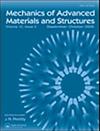基于修正耦合应力理论的扭杆模型的数值验证
IF 3.6
3区 材料科学
Q1 MATERIALS SCIENCE, CHARACTERIZATION & TESTING
Mechanics of Advanced Materials and Structures
Pub Date : 2024-09-12
DOI:10.1080/15376494.2024.2398738
引用次数: 0
摘要
这项研究验证了经典的圣-维南位移场是否适用于微尺度的扭杆模型,该位移场原本用于宏观尺度的扭转行为。本文章由计算机程序翻译,如有差异,请以英文原文为准。
Numerical verification of torsion-bar models based on the modified couple stress theory
This study verifies the suitability of the classical Saint–Venant’s displacement field, originally intended for macroscale torsional behavior, to microscale torsion-bar models within the modified c...
求助全文
通过发布文献求助,成功后即可免费获取论文全文。
去求助
来源期刊

Mechanics of Advanced Materials and Structures
工程技术-材料科学:表征与测试
CiteScore
5.30
自引率
17.90%
发文量
405
审稿时长
12 months
期刊介绍:
The central aim of Mechanics of Advanced Materials and Structures ( MAMS) is to promote the dissemination of significant developments and publish state-of-the-art reviews and technical discussions of previously published papers dealing with mechanics aspects of advanced materials and structures. Refereed contributions describing analytical, numerical, and experimental methods and hybrid approaches that combine theoretical and experimental techniques in the study of advanced materials and structures are published, along with critical surveys of the literature and discussions of papers in the field.
Mechanics of layered structures, with layers of any materials (metallic, foams, piezoelectric, composites, ceramic, functionally graded, etc.) at various scales, milli/micro/nano-meter is of MAMS interest. Applications to structures subjected to mechanical, thermal, electrical, magnetical, hygrothermal, etc., as well as any coupled combinations of these all are of interests for MAMS. That is mechanics of multi-fields problems at various scale are of interest for MAMS, including fluid-strictures interactions.
Static and dynamic as well linear and nonlinear problems are of interest; advanced development of new materials with applications to automotive, civil, marine, aeronautical, space and bioengineering structures at various scales are of interest of this journal. Of special interest are methods and techniques for a better understanding of mechanics of metamaterials as well as the interaction with additive manufacturing technologies.
 求助内容:
求助内容: 应助结果提醒方式:
应助结果提醒方式:


